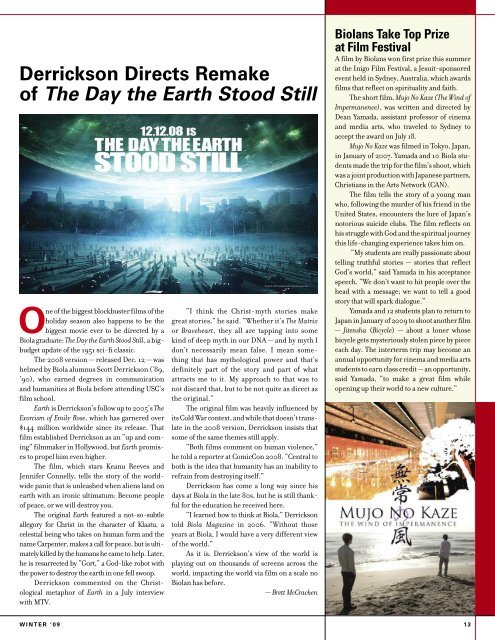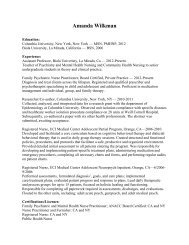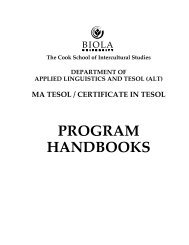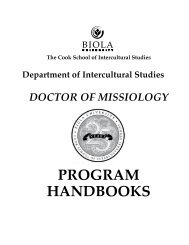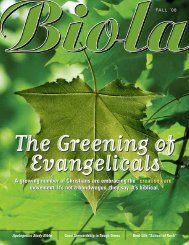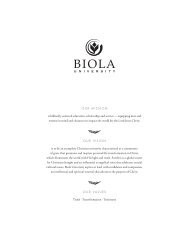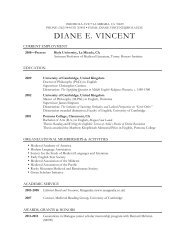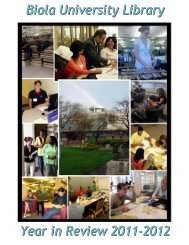Create successful ePaper yourself
Turn your PDF publications into a flip-book with our unique Google optimized e-Paper software.
Derrickson Directs Remake<br />
of The Day the Earth Stood Still<br />
One of the biggest blockbuster films of the<br />
holiday season also happens to be the<br />
biggest movie ever to be directed by a<br />
<strong>Biola</strong> graduate: The Day the Earth Stood Still, a bigbudget<br />
update of the 1951 sci-fi classic.<br />
The 2008 version — released Dec. 12 — was<br />
helmed by <strong>Biola</strong> alumnus Scott Derrickson (’89,<br />
’90), who earned degrees in communication<br />
and humanities at <strong>Biola</strong> before attending USC’s<br />
film school.<br />
Earth is Derrickson’s follow up to 2005’s The<br />
Exorcism of Emily Rose, which has garnered over<br />
$144 million worldwide since its release. That<br />
film established Derrickson as an “up and coming”<br />
filmmaker in Hollywood, but Earth promises<br />
to propel him even higher.<br />
The film, which stars Keanu Reeves and<br />
Jennifer Connelly, tells the story of the worldwide<br />
panic that is unleashed when aliens land on<br />
earth with an ironic ultimatum: Become people<br />
of peace, or we will destroy you.<br />
The original Earth featured a not-so-subtle<br />
allegory for Christ in the character of Klaatu, a<br />
celestial being who takes on human form and the<br />
name Carpenter, makes a call for peace, but is ultimately<br />
killed by the humans he came to help. Later,<br />
he is resurrected by “Gort,” a God-like robot with<br />
the power to destroy the earth in one fell swoop.<br />
Derrickson commented on the Christ -<br />
ological metaphor of Earth in a July interview<br />
with MTV.<br />
“I think the Christ-myth stories make<br />
great stories,” he said. “Whether it’s The Matrix<br />
or Braveheart, they all are tapping into some<br />
kind of deep myth in our DNA — and by myth I<br />
don’t necessarily mean false. I mean something<br />
that has mythological power and that’s<br />
definitely part of the story and part of what<br />
attracts me to it. My approach to that was to<br />
not discard that, but to be not quite as direct as<br />
the original.”<br />
The original film was heavily influenced by<br />
its Cold War context, and while that doesn’t translate<br />
in the 2008 version, Derrickson insists that<br />
some of the same themes still apply.<br />
“Both films comment on human violence,”<br />
he told a reporter at ComicCon 2008. “Central to<br />
both is the idea that humanity has an inability to<br />
refrain from destroying itself.”<br />
Derrickson has come a long way since his<br />
days at <strong>Biola</strong> in the late 80s, but he is still thankful<br />
for the education he received here.<br />
“I learned how to think at <strong>Biola</strong>,” Derrickson<br />
told <strong>Biola</strong> Magazine in 2006. “Without those<br />
years at <strong>Biola</strong>, I would have a very different view<br />
of the world.”<br />
As it is, Derrickson’s view of the world is<br />
playing out on thousands of screens across the<br />
world, impacting the world via film on a scale no<br />
<strong>Biola</strong>n has before.<br />
— Brett McCracken<br />
<strong>Biola</strong>ns Take Top Prize<br />
at Film Festival<br />
A film by <strong>Biola</strong>ns won first prize this summer<br />
at the Inigo Film Festival, a Jesuit-sponsored<br />
event held in Sydney, Australia, which awards<br />
films that reflect on spirituality and faith.<br />
The short film, Mujo No Kaze (The Wind of<br />
Impermanence), was written and directed by<br />
Dean Yamada, assistant professor of cinema<br />
and media arts, who traveled to Sydney to<br />
accept the award on July 18.<br />
Mujo No Kaze was filmed in Tokyo, Japan,<br />
in January of 2007. Yamada and 10 <strong>Biola</strong> students<br />
made the trip for the film’s shoot, which<br />
was a joint production with Japanese partners,<br />
Christians in the Arts Network (CAN).<br />
The film tells the story of a young man<br />
who, following the murder of his friend in the<br />
United States, encounters the lure of Japan’s<br />
notorious suicide clubs. The film reflects on<br />
his struggle with God and the spiritual journey<br />
this life-changing experience takes him on.<br />
“My students are really passionate about<br />
telling truthful stories — stories that reflect<br />
God’s world,” said Yamada in his acceptance<br />
speech. “We don’t want to hit people over the<br />
head with a message; we want to tell a good<br />
story that will spark dialogue.”<br />
Yamada and 12 students plan to return to<br />
Japan in January of 2009 to shoot another film<br />
— Jitensha (Bicycle) — about a loner whose<br />
bicycle gets mysteriously stolen piece by piece<br />
each day. The interterm trip may become an<br />
annual opportunity for cinema and media arts<br />
students to earn class credit — an opportunity,<br />
said Yamada, “to make a great film while<br />
opening up their world to a new culture.”<br />
W I N T E R ’ 0 9 1 3


